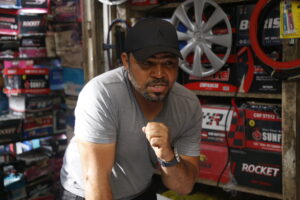
Ramsey Nouah has had success directing two of Nollywood’s top films: “Living In Bondage: Breaking Free” and “Rattlesnake: The Ahanna Story.” Both films, which earned him Director of the Year honours at the Best of Nollywood Awards (2020) and AMVCAs (2022), are reimaginings of Nollywood classics. While it’s not uncommon for actors to step into the role of a director, tackling a directorial debut by remaking beloved classics—treasured by a generation who holds them dear—is an endeavour far from easy.
“When doing a remake, it’s actually more challenging because you’re trying to resonate with the original audience while appealing to a new one,” Ramsey tells BellaNaija. “You want to bring in a new angle without losing either demographic. That felt really compelling when I did the remakes.”
Despite the inherent challenges of reinterpreting these classics, one cannot overlook how masterfully Ramsey executed the task, a sentiment well encapsulated by the popular Gen Z phrase, “he killed it.”
Now, Ramsey steps into new territory with Tòkunbọ̀, a crime thriller that marks his directorial foray into original storytelling. His preference for the kinds of movies he directs reflects his inclinations—he is drawn to the darker aspects of narrative. “I’m a sucker for dark elements, like dark comedies and shades, but the story wasn’t meant to be dark. It was intended to have a lot of suspense. So I tried to add a bit of darkness, which made it more challenging, adding depth and other elements,” he shares.
Similar to his experience directing the classics, helming Tòkunbọ̀ was no easy feat. The Lagos-born actor confesses that the process was somewhat overwhelming, as he aimed to surpass his previous work, an effort that took a toll on him.

Tòkunbọ̀ is a Yoruba name given to a child born abroad and brought back home. It is also a colloquial term for imported second-hand goods, particularly cars. Gideon Okeke stars as Tòkunbọ̀, an ex-car smuggler, determined to turn his life around. Driven by the desire to be a devoted husband and father to his gravely ill 18-month-old baby, he longs for the simplicity of a normal life. But life can be tricky. One minute, Tòkunbọ̀ is searching for legitimate ways to raise funds for his child’s medical bills; the next, he finds himself entangled in a dangerous situation. With only three hours to deliver a government official’s daughter to her captor, he faces the harrowing possibility of losing his family if he fails.
Gideon describes Tòkunbọ̀ as “fast-paced with a pulse.” It has a heartbeat,” he says. Although he has starred in major, multi-million-dollar films, no project has resonated with him as profoundly as Tòkunbọ̀. He admits the film “kicked his butt.” On an intensity scale, Tòkunbọ̀ was a solid 10 for Gideon. “It was intense from day one. It was challenging every day for everyone involved—actors, producers, directors. We faced obstacles daily, and before we knew it, we were 45 days in.”

Born in Lagos and raised in Ajegunle, Gideon was drawn to the role due to Tòkunbọ̀’s relatability as a character. He found a profound connection in portraying an ordinary man who starts his day at 8 a.m. and ends it around midnight, navigating the complexities of daily life. “The guy was going through it and I had my own fair share of it too. So it was easy to connect with something I was dealing with or something he was dealing with.”
Gideon hopes this authenticity resonates with everyone who watches the film. He believes that a film loses its essence if viewers can’t see a reflection of themselves in the characters.
He hopes the everyday Nigerian, and anyone can see their struggles mirrored in Tòkunbọ̀’s story. “It’s the same 24 hours, but we really run a mile over it. I hope the film resonates with the average person across societal classes—it’s for humanity, not just Nigerians.”

“I was trying to see how we can emasculate the essence of the power of women in society, emphasising their capabilities and potential. I focused on addressing sexism, highlighting the importance of empowering women. I also approach it from the woman’s perspective, ensuring an emotional connection to the issue. This angle allows her to make a critical choice between her work and the demands placed on her, striving to maintain power in both areas without compromise.
Despite the pressures, she doesn’t give in to what others demand. Instead, she tries to navigate the situation, showcasing that a woman’s strength is multifaceted. I emphasised this strongly as I believe it to be a compelling way to push the agenda of women’s empowerment.”
Now streaming on Netflix, Ramsey characterises Tòkunbọ̀ as a “good thriller” and is hopeful about how viewers will perceive and receive the film.
“I don’t have the foresight into the expectations of what people will say. I just keep it open and remain positive. My only wish is that they all love it. And if they love it, then that’s good enough for me.”
The post Exploring the Gripping and Relatable World of “Tòkunbọ̀” with Ramsey Nouah & Gideon Okeke appeared first on BellaNaija - Showcasing Africa to the world. Read today!.
from BellaNaija https://ift.tt/BYIiOXs
